Public complaints, industry criticism and a new state law are shifting the landscape for party vehicles as the industry heads into a third year under Metro’s watch.
An industry-backed push to override city regulations at the state level failed with a caveat. Rather than remake Nashville’s entire entertainment transportation vehicle regulatory structure, lawmakers — lobbied by statehouse veterans McMahan Winstead & Richardson and led by House Majority Leader William Lamberth (R-Portland) — enshrined ETV operators’ permits with additional protections.
Top state lawmaker curbs effort to take over transpotainment after a kindly worded email from O’Connell
These will be tested at permit renewal hearings on May 16. Renewals can cost $2,500 to $5,000, and many operators face specific, detailed complaints submitted to the city via Metro’s non-emergency services portal hubNashville. Nashville Party Wagon alone earned 70 alleged violations since last year’s permit hearings.
Several legal categories of entertainment transportation companies — from pedal taverns to sightseeing trolleys to party barges — sit under the eye of Metro’s Transportation Licensing Commission. The body has become the focal point of tension between and among industry operators (who often point fingers at each other) and city regulators, specifically Nashville Department of Transportation director Diana Alarcon, who frequently sits in on TLC meetings.
“There’s an ongoing topic I’d like to bring to the commission’s forefront,” Michael Winters, owner of the Nashville Tractor, told the TLC at a March 23 meeting. “No offense to the NDOT director, but that seat seems to be self-appointed. Since 2022-ish, a table has been pulled up, a live mic has been provided, all interjections from the NDOT director have been allowed, not objected to, and that sways the opinion of the TLC.”
Winters’ accusations that Alarcon violated city and commission charters reflect a frustration among operators who suspect the city wants to see their business die. The same day, Honky Tonk Party Bar owner Grant Rosenblatt followed Winters’ public comment with his own accusations leveled at Alarcon and NDOT. After a few minutes of mincing words, he went after industry operators’ favorite double standard: Old Town Trolley Tours. Drivers would likely recognize the green-and-orange buses cruising along Music Row and through Midtown.
“It’s the crux in my concern that lies in the preferential treatment afforded to this particular company for the last at least two years,” Rosenblatt told commissioners. “I also propose the board suspend any discussions related to permitting or permit renewal until a transparent explanation is provided regarding why this specific company is exempt while all other companies are restricted.”
Metropolitik: Tourism transportation still out of harmony three years into regulation attempt
Muttering broke out between commissioners. One commissioner said Old Town had, to his knowledge, received no citations from Metro. Another suggested that the body subpoena Old Town’s payroll records to confirm its hours of operation, the key point of concern for Rosenblatt and other entertainment-vehicle owners who are barred from running vehicles between 4 and 6 p.m. Old Town Trolleys ignored these restrictions, Rosenblatt said. Stepping in, Alarcon said the previous director had given the trolley verbal permission to run by its own rules.
When Alarcon’s predecessor Billy Fields showed up to receive an award at the TLC’s April 18 meeting, Winters showed up again, asking the body to explain the special route. The commission deferred discussion. Attorneys in the room squirmed.
Written complaints submitted via hubNashville back up the apparent double standard.
“The Sightseeing Bus is operating during the 4pm-6pm peak hours curfew,” reads a complaint signed by Lisa Haller. “This is the 4th incident that I’ve reported of Old Town Trolley in a week. Is the curfew still in effect or just not being enforced?”
These complaints form the legal basis for commissioners to potentially revoke next year’s permits. The Scene reviewed all 208 submitted to Metro since permits were issued last year. About half were submitted anonymously, while the other half came from four individuals: Haller, Jim Schmitz, Michael Hayes (a TLC commissioner) and an individual responsible for 95 complaints who left only a Gmail address. This ETV snitch, whose complaints cited specific lines of Metro code and included time-stamped photo evidence, did not return a request for comment.

“Nobody, whether a downtown resident or downtown worker in an office, bargained for the craziness of Lower Broadway moving up and down the streets,” Schmitz tells the Scene. “But it just kept spreading. Metro throughout just didn’t put a … priority on enforcing existing laws.”
Schmitz has since moved near Brentwood. Like many other complainants, he zeroed in on the sound level of music (by law, it can’t be audible 50 feet away). Commissioner Hayes submitted four complaints in the final week of March, knocking Old Town twice as well as Cruzzin’ Nashville and Grey Lion Tours.
“Where I’d be curious is, when it’s time for relicensing in a month, it’s one of the things that is supposed to be reported to us as licensing commissioners,” Hayes tells the Scene. “I didn’t file it anonymously. I took a picture of what I saw and sent it through the vehicle it was supposed to be sent through, not as a commissioner but as a guy from Nashville who works downtown and is invested in downtown.”
All 27 operators, who hold more than 80 vehicle permits collectively, will come up for renewal in May. New applicants can vie for permits as well.
“We’ll evaluate who wants to renew, who has insurance to renew, and who’s had violations,” Hayes says. “I don’t know what the TLC is going to do, but if you were to look at the tone of the meetings and the regulations, I think if you don’t already have a license, it will be hard to get a license.”





